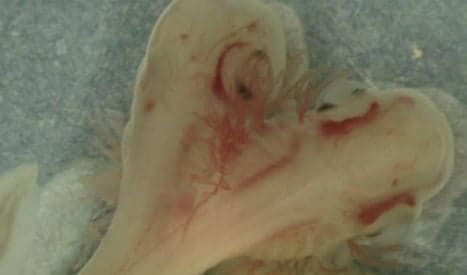Two-headed shark born in Spanish laboratory

Scientists at the University of Malaga found the embryo of a shark with two heads and just one body.
The shark embryo belongs to the rare and threatened species Galeus atlanticus, a fish being studied by researchers at a lab in the Malaga university, according to a paper published in the Journal of Fish Biology.
Its two head each had "a mouth, two eyes, a brain, a notochord and five gill openings on each side", according to the scientists, and the two heads came together just behind the gils.
Most of the shark’s organs were fused too but contained within one body.

"There were two hearts, two oesophaguses, two stomachs, two livers, but a single intestine with a spiral valve," the team write.
The research paper explains that the two-headed shark embryo would have had difficulty surviving at sea, because its condition would have struggled to swim fast and hunt.
The new discovery is thought to be the result of genetics rather than any kind of mutation caused by pollution, and could help shed light on the mystery of dicephaly – the phenomenon when animals are born with two heads.
The shark was one of 797 embryos originally intended to be used in studies of the cardiovascular system.
"As far as is known, this paper gives the first description of a two-headed shark embryo belonging to an oviparous species" said the authors, describing a species that hatches eggs outside the body rather than gives birth to live young.,
This species of shark grows up to 45cm in length and poses no threat to man.

A two-headed shark could never survive in the wild. Photo: Screenshot from movie.
A 2012 low budget horror film starring Carmen Electra featured a two-headed man-eating shark as the villain.
Comments
See Also
The shark embryo belongs to the rare and threatened species Galeus atlanticus, a fish being studied by researchers at a lab in the Malaga university, according to a paper published in the Journal of Fish Biology.
Its two head each had "a mouth, two eyes, a brain, a notochord and five gill openings on each side", according to the scientists, and the two heads came together just behind the gils.
Most of the shark’s organs were fused too but contained within one body.

"There were two hearts, two oesophaguses, two stomachs, two livers, but a single intestine with a spiral valve," the team write.
The research paper explains that the two-headed shark embryo would have had difficulty surviving at sea, because its condition would have struggled to swim fast and hunt.
The new discovery is thought to be the result of genetics rather than any kind of mutation caused by pollution, and could help shed light on the mystery of dicephaly – the phenomenon when animals are born with two heads.
The shark was one of 797 embryos originally intended to be used in studies of the cardiovascular system.
"As far as is known, this paper gives the first description of a two-headed shark embryo belonging to an oviparous species" said the authors, describing a species that hatches eggs outside the body rather than gives birth to live young.,
This species of shark grows up to 45cm in length and poses no threat to man.

A two-headed shark could never survive in the wild. Photo: Screenshot from movie.
A 2012 low budget horror film starring Carmen Electra featured a two-headed man-eating shark as the villain.
Join the conversation in our comments section below. Share your own views and experience and if you have a question or suggestion for our journalists then email us at [email protected].
Please keep comments civil, constructive and on topic – and make sure to read our terms of use before getting involved.
Please log in here to leave a comment.